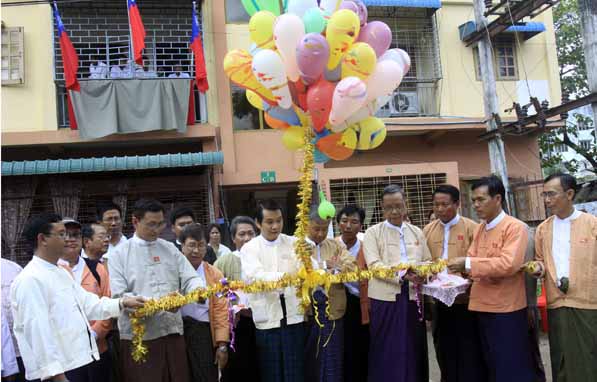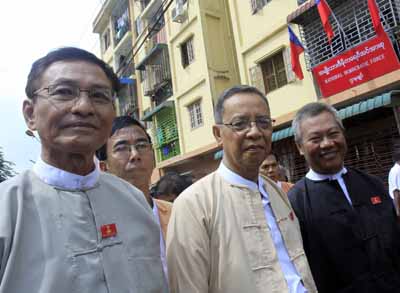Avoiding Details Like the Devil

The USDP also intends to fulfill the junta’s economic objective of keeping the power to shape the national economy in the hands of the state, which Aung Than refers to as “state capitalism.” This means the USDP will continue to allow the government to stage-manage the economy in favor of the major players, who under the current privatization trend will end up owning most non-state businesses and resources, while still not allowing farmers to own their own land.
 |
| NDF leader Khin Maung Swe, left, and chairman Than Nyein outside the party’s Rangoon headquarters. (Photo: The Irrawaddy) |
“We call it ‘Association for the Promotion of the People’s Social and Economic Life,’ which is a bottom-up approach led by the villagers themselves,” Aung Than, a Supreme Court lawyer, told The Irrawaddy. “The government’s role is just as a stakeholder to give initial financial support to the associations and later withdraw its share when they have the capacity to function by themselves.”
Aung Than criticized the economic associations currently managing different sectors of the economy as top-down systems operating with the blessing of the generals in power and formed for the benefit of the businessmen, not for the poor.
With regard to the recent privatization of state-owned businesses such as fuel distribution, seaport operation and private airline operation, Aung Than said: “The market lacks real competition and a handful of rich businessmen enjoy these opportunities while the majority have little access to the capital. We need to change this situation.”
The Shan Nationalities Democratic Party (SNDP) and the Chin Progressive Party (CPP) appear to be in line with the DPP when it comes to supporting something close to a true free market economy. The SNDP platform says it will practice a free market economy that conforms with the world trade system, and priority will be given to active cooperation with regional and global economic groups.
But when asked by The Irrawaddy to expound on his party’s economic platform, in particular how it intended to cooperate with regional groups and conform the Burmese economy to the world trade system, an SNDP executive committee member said that his party’s policies were determined by the executive committee and he could not provide any further details about the policies or produce an internal expert who could explain them.
The CPP platform says the party will practice a “modern agriculture-based free market economy,” and priority will be given to free trade and allowing both locals and foreigners to invest in the banking business. But the platform also says the party will conduct the development of small, medium and heavy industries, as well as the extraction of the natural resources in a particular region to help support that regions’ development, suggesting some government role in managing the economy.
The macro-economic polices of the National Political Alliances (NPA) party are also a mixed bag. While its platform says that the state will encourage “an accumulation of wealth” by the private sector and the introduction of a functioning stock exchange as an essential characteristic of the market economy, it also says the state will protect, by law, “a fair distribution of wealth” and that ways must be found to distribute the natural resource revenues for the welfare of the people in areas such as health, education and social security—with priority given to immediate public needs such as electricity, clean water, the stability of the commodity prices, low-cost housing, better transportation and communication systems.
The National Democratic Force (NDF), which is led by former leaders of the National League for Democracy (NLD), accepts an even more prominent role for the state in regulating the market and promoting the expanded participation of the private sector. The NDF would practice “social liberalism” through a “market-oriented mixed economy,” according to a policy document published by the party.
« previous 1 | 2 | 3 next page »
